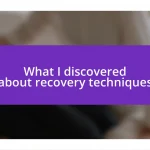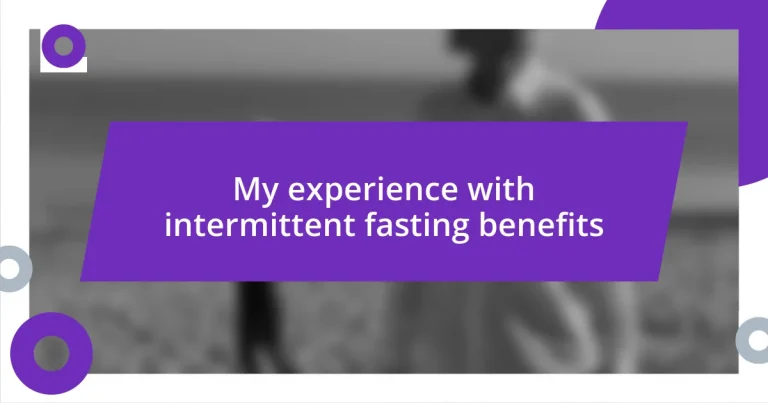Key takeaways:
- Intermittent fasting enhances mental clarity and focus, promoting a deeper understanding of hunger cues and personal growth.
- Different methods of intermittent fasting (like 16/8 and 5:2) offer flexible options, allowing individuals to find a style that fits their lifestyles.
- Long-term fasting practice leads to improved relationships with food, greater self-discipline, and notable health benefits beyond weight loss.
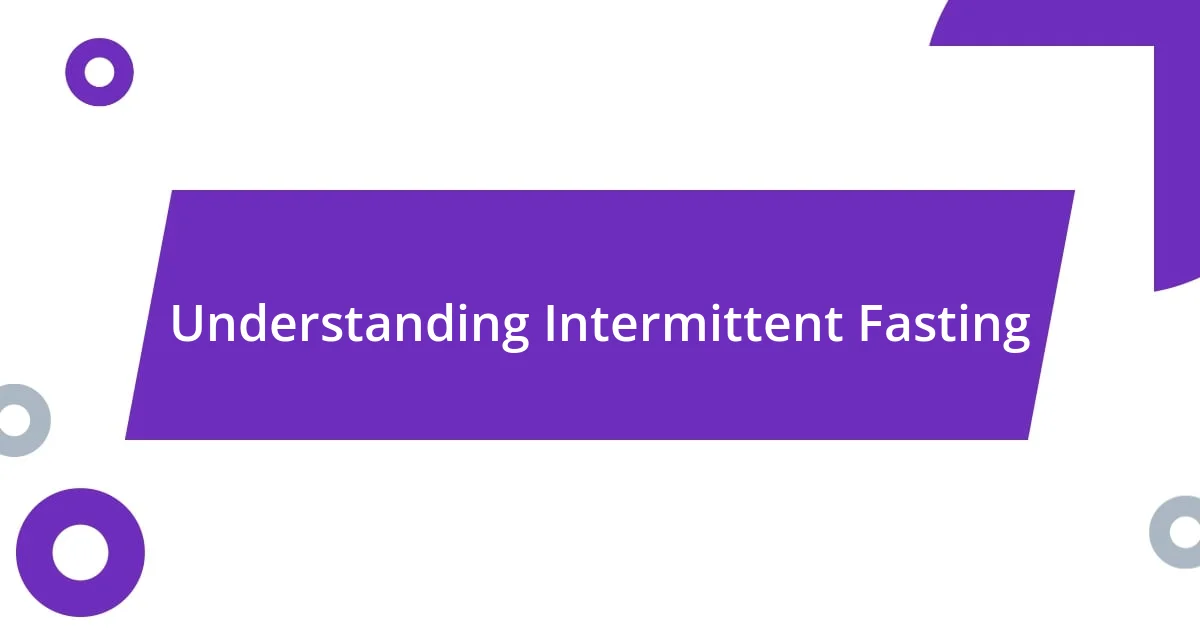
Understanding Intermittent Fasting
Intermittent fasting, or IF, isn’t about denying myself food; instead, it’s about timing meals to harness the body’s natural rhythms. I remember my first experience with it; I hesitated, thinking, “Can I really go without breakfast?” But once I committed, I realized my energy levels surged, and I felt more in tune with my hunger cues.
What’s fascinating is how our bodies respond to fasting. During my fasting periods, I found clarity and focus that often eluded me during constant snacking. Have you ever noticed how your mind clears when you step away from distractions like food? This clarity is something I cherish during my fasting hours—a kind of mental reset that fuels my productivity.
The beauty of intermittent fasting lies in its simplicity; there’s no complicated meal prep or calorie counting. When I first began, I focused on the 16/8 method, eating only within an eight-hour window. It felt liberating! Suddenly, I had more time in my day, less time spent thinking about what to eat, and a newfound appreciation for the meals I did have. Isn’t it intriguing how changing when you eat can lead to such profound shifts in your lifestyle?
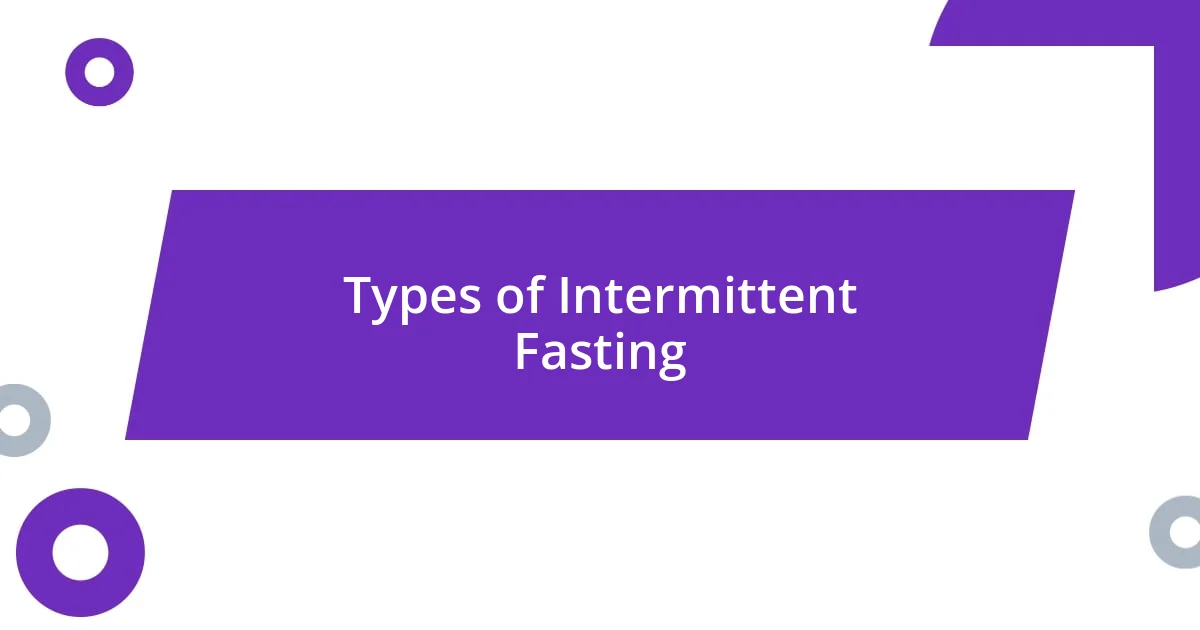
Types of Intermittent Fasting
Intermittent fasting comes in several styles, each catering to different preferences and lifestyles. For instance, the 16/8 method was my go-to; I’d fast for 16 hours and eat during an 8-hour window. This format worked seamlessly for me because it simply fit into my daily routine—skipping breakfast while enjoying a satisfying lunch and dinner felt like a natural choice.
Then there’s the 5:2 method, which caught my attention too. Here, you eat normally for five days and restrict your calorie intake to about 500-600 calories on two non-consecutive days. I tried this method as well, and I found the focused days surprisingly manageable. While it was challenging at times, it allowed me to experiment with different foods while still reaping fasting’s benefits.
Finally, we have the eat-stop-eat style, which involves a full 24-hour fast once or twice a week. The first time I attempted this, I experienced a mix of hunger and determination. Although it was tough, the sense of accomplishment at the end was worth it. I could feel my body responding positively, which encouraged me to continue. Each method presents unique challenges and rewards, creating a personalized journey through fasting.
| Type of Intermittent Fasting | Description |
|---|---|
| 16/8 | Fast for 16 hours, eat during an 8-hour window. |
| 5:2 | Eat regularly for 5 days, restrict calories to 500-600 on 2 days. |
| Eat-Stop-Eat | Fast for 24 hours once or twice a week. |
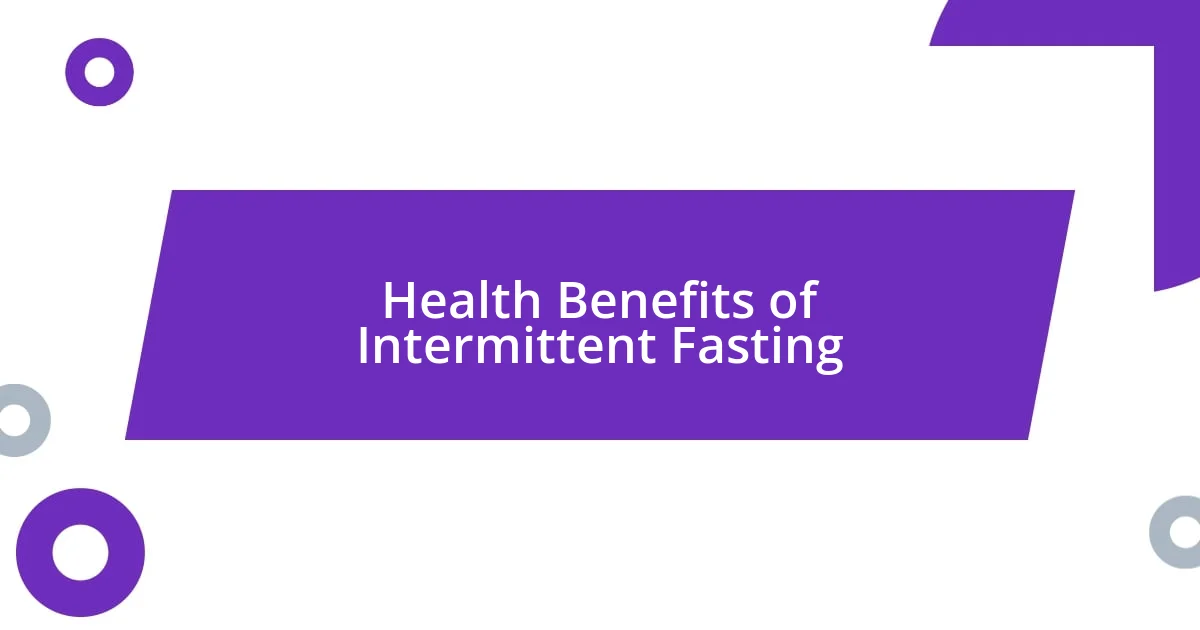
Health Benefits of Intermittent Fasting
Intermittent fasting offers noteworthy health benefits that go beyond just weight loss. I like how it can kick-start cellular repair processes. When I first experienced my fasting windows, I noticed an unexpected reduction in inflammation, which was a game changer for my overall well-being. This shift was almost like my body was getting a gentle reset, allowing it to function more optimally.
As I continued on this journey, I discovered several specific advantages:
- Improved Metabolic Health: Fasting helped lower my blood sugar levels and improved insulin sensitivity.
- Heart Health: I found that my cholesterol levels improved, which made me feel more at ease about my cardiovascular fitness.
- Brain Function: It’s fascinating how intermittent fasting can promote brain health, boosting neurotrophic factors and reducing the risk of neurodegeneration.
- Longevity: Interestingly, some studies suggest it can potentially extend lifespan, a thought that gave me a fresh perspective on how I view my health choices.
These benefits seemed to deepen my connection to the practice, reinforcing the idea that this lifestyle shift worked in harmony with my body rather than against it.
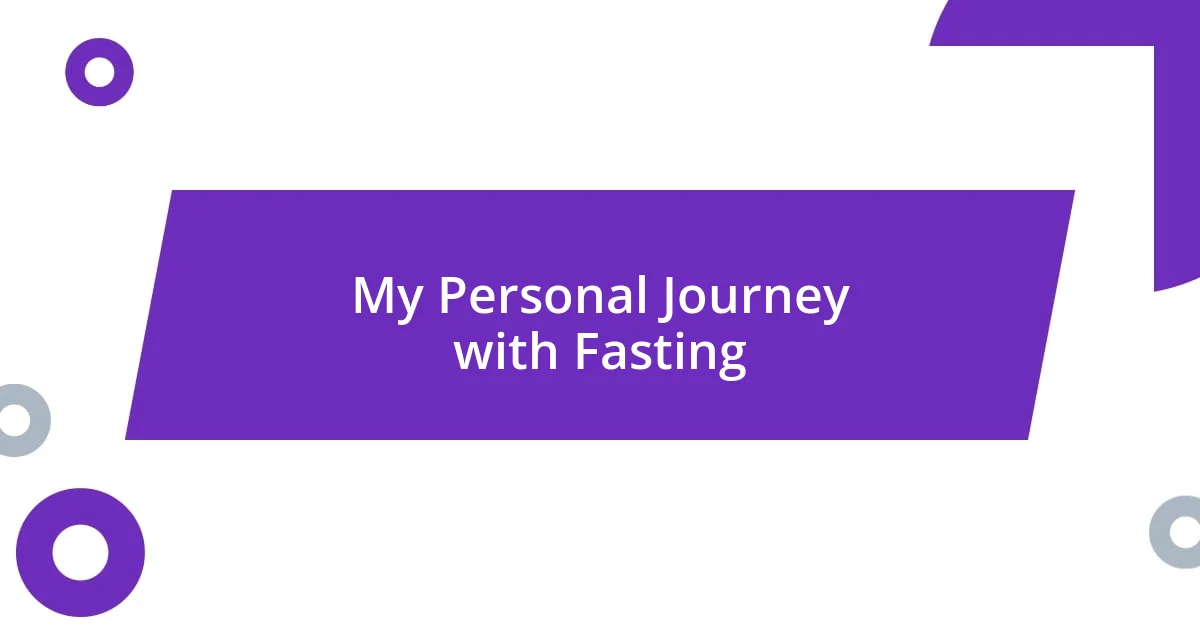
My Personal Journey with Fasting
When I first started my fasting journey, I wasn’t quite sure what to expect. One evening, after finishing my meal, I suddenly realized I was about to embark on my first 16-hour fast. It felt daunting at first—could I really go without food for so long? Yet, as I navigated through those hours, I found strength I didn’t know I had. Instead of feeling deprived, I felt a surprising clarity.
On my fifth day attempting the 5:2 method, I remember sitting at my desk, stomach grumbling, and contemplating a snack. But then I shifted my focus to how empowered I felt choosing restraint over indulgence. I still reminisce about that day. It turned into a reminder that sometimes, what seems like a limitation can lead to personal growth. I began relishing the satisfaction that came from overcoming those small battles.
Perhaps the most memorable challenge was my first 24-hour fast. The hunger pangs hit hard, but amidst the struggle, I felt an exhilarating sense of freedom. Going without food for a day allowed me to tap into a deeper understanding of my relationship with nourishment. Each tick of the clock felt like a countdown to deeper self-awareness rather than simple fasting. Looking back, I cherish those moments—it wasn’t just about the fast; it was about discovering parts of myself I hadn’t known before.
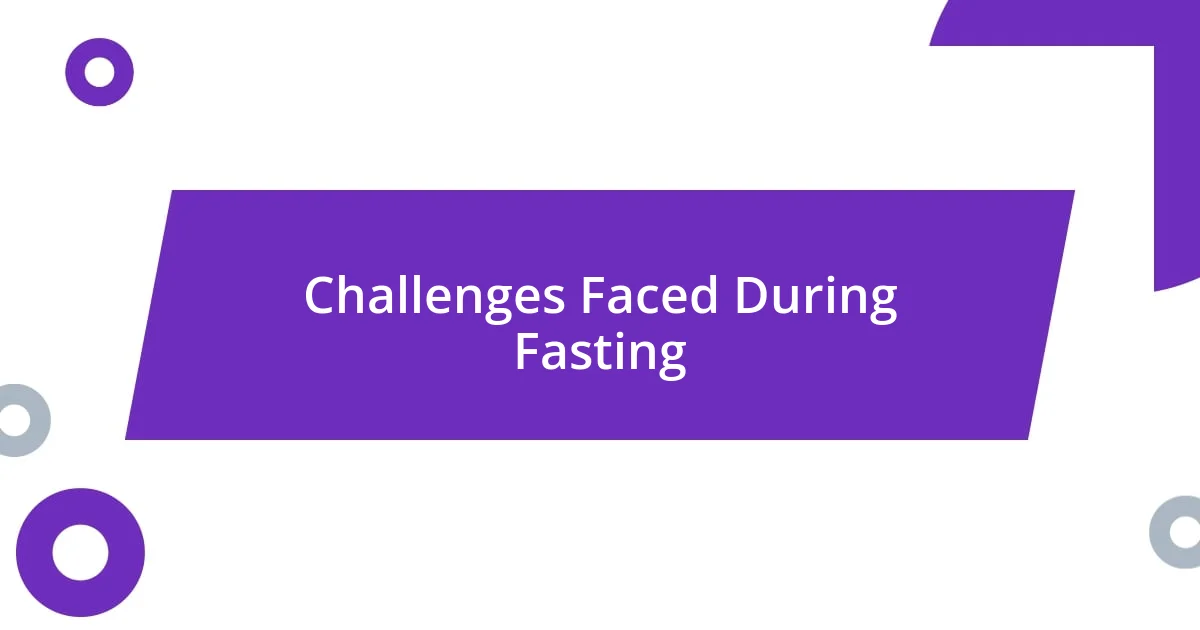
Challenges Faced During Fasting
Fasting can be quite an emotional rollercoaster. I vividly remember my first day trying a 16-hour fast. The clock felt like it was moving in slow motion, and I found myself staring longingly at the snacks in my pantry. Have you ever felt that intense longing for something you can’t have? In that moment, I realized how much my surroundings influenced my cravings.
Another hurdle I faced was social gatherings. It’s not always easy to stick to fasting when everyone around you is enjoying a meal. I recall a friend’s birthday party where the aroma of delicious food was nearly overwhelming. I had to remind myself of my goals and the progress I’d made, but it was tough. How do you balance social life and your commitment to fasting? I learned that it’s essential to communicate my goals to friends—many were supportive once they understood.
Then there were days when my energy levels dipped lower than expected. During one particularly long fast, I felt mentally foggy and a bit irritable. Have you ever had those moments where concentration feels just out of reach? I had to remind myself that fasting isn’t just about physical challenges; it also tests your mental fortitude. To cope, I started focusing on hydration and light activities, which helped me regain my clarity.
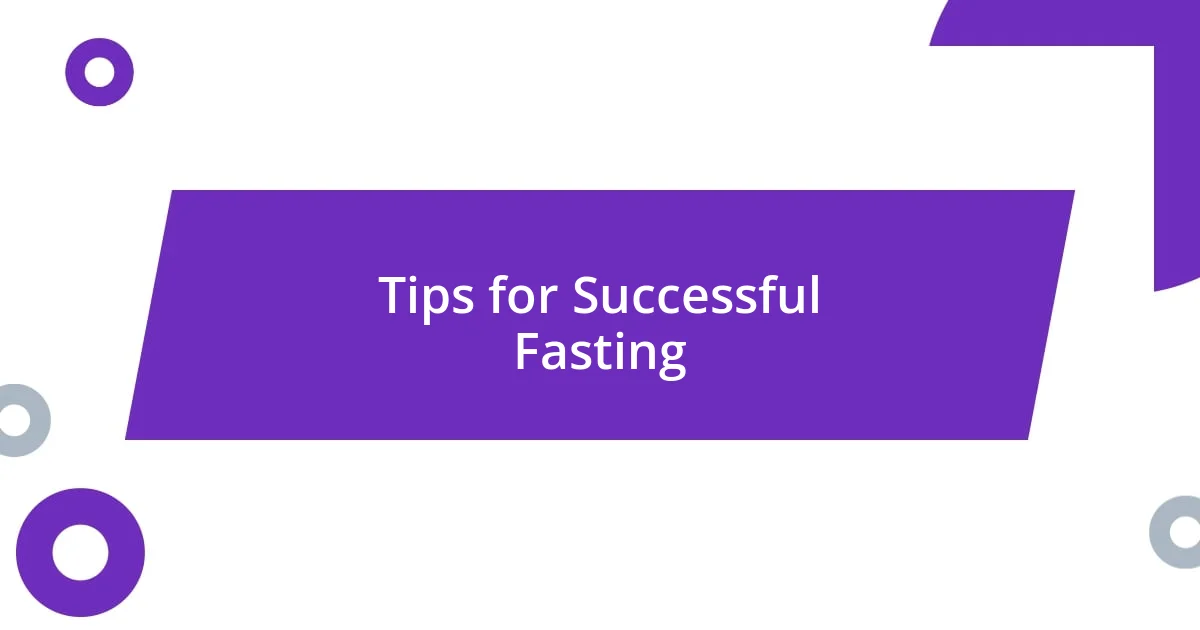
Tips for Successful Fasting
One of the most effective tips I can share is to stay well-hydrated. When I began fasting, I discovered water was my best ally. During those times of hunger, I’d fill my glass and remind myself that staying hydrated helped curb cravings and kept my mind sharp. It’s interesting how something so simple can elevate your fasting experience, right?
Another crucial aspect is to plan your meals around your fasting schedule. I learned this the hard way after finishing a fast with a heavy meal that left me feeling bloated and uncomfortable. Now, I opt for lighter, balanced meals, rich in nutrients. Knowing what to eat has transformed my post-fast experience and made it far more enjoyable.
Lastly, I’ve found that journaling about my fasting experiences really benefits my mindset. Reflecting on my thoughts and feelings during those moments made me more aware of my motivations and struggles. Have you ever considered how much insight you can gain simply by writing things down? It’s incredible how documenting the journey not only records progress but allows me to connect more deeply with my goals.
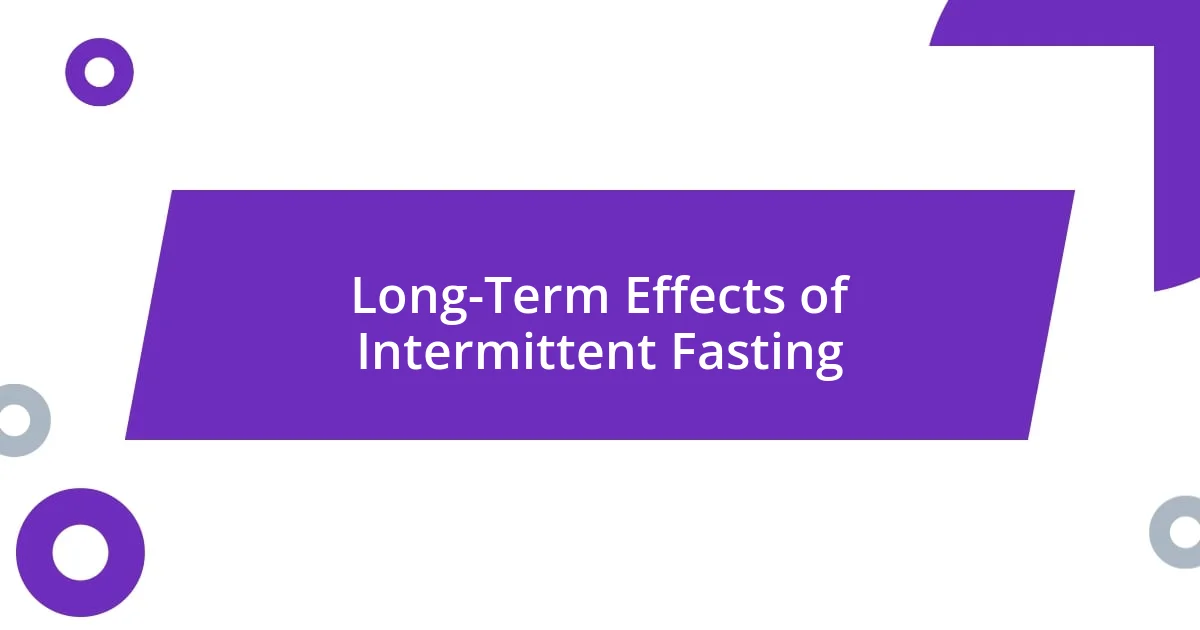
Long-Term Effects of Intermittent Fasting
The long-term effects of intermittent fasting have been fascinating for me. After several months, I noticed a significant change not just in my physique, but in my mental clarity. I felt more alert and focused, almost as if my brain had been given a refreshing reboot. Have you ever experienced a moment where everything just clicks? For me, that was the turning point.
As I continued with intermittent fasting, my relationship with food evolved. Initially obsessing over what I couldn’t have, I shifted to appreciating nutritious options. I found myself genuinely excited about my meals rather than viewing them as mere fuel. It was a lightbulb moment—food became an experience, not a challenge. Has there ever been a time when food sparked joy for you rather than just serving a purpose?
One unexpected benefit I encountered was a greater sense of self-discipline. Fasting taught me to resist immediate gratification for a more rewarding experience later on. The practice strengthened my willpower, impacting other areas of my life as well. I remember sitting in front of my favorite dessert, and instead of indulging, I paused to appreciate it as a moment of mindfulness rather than an impulse. Isn’t it powerful when you realize that your choices can lead to unexpected personal growth?










